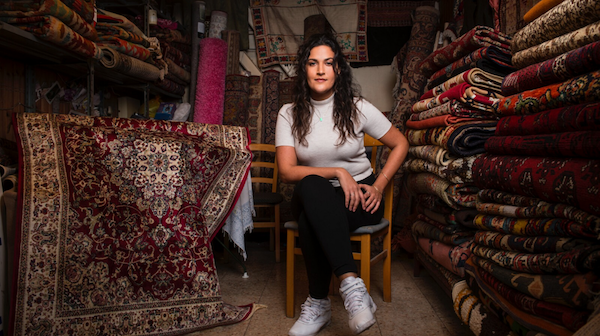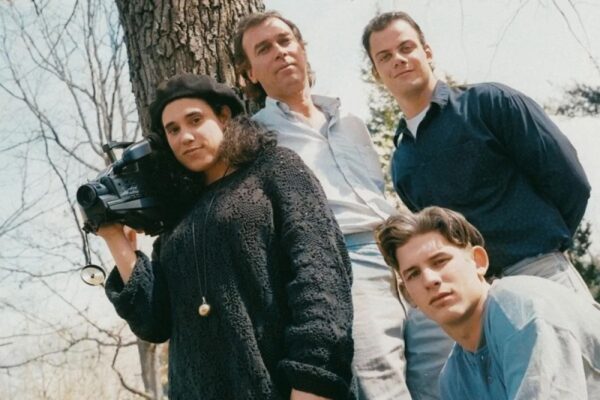Film Festival Reviews: Sundance 2 – Sly Stone, A Left-Leaning Israeli Comedian, and Teen Journalism
By David D’Arcy
A trio of documentaries: one explores an under-recognized Black musician, while the other two focus on a leftist Israeli comedian and crusading teen journalists.
Sundance often premieres performance films, and one standout this year was Sly Lives! (aka The Burden of Black Genius), directed by Ahmir “Questlove” Thompson — drummer, bandleader, journalist, and Oscar-winning filmmaker.
The film fits with Sundance’s annual practice of recognizing and honoring under-appreciated talent – a kind of cultural archaeology. The career of Sylvester Stewart (b. 1943) offers no shortage of talent, a dramatic rise and fall, visual extravagance, and music that inspired huge audiences.. Onscreen at Sundance, Sly Lives! at times felt like a party, as a Sly and the Family Stone concert often was.
If you never saw the man live, you already got a sense of Sly Stone onstage in Questlove’s debut film, the 2021 documentary Summer of Soul, which resurrected tapes of a rock festival of Black artists held in 1969 in a Harlem park – at the time of Woodstock and in that event’s long shadow. Besides Stone, the bill included the Chambers Brothers, Gladys Knight, the 5th Dimension and Nina Simone. Questlove pulled together footage that was never shown before, in a film filled with throbbing spontaneity. One of the doc’s strengths was that the cameras caught the performers and the audiences in exactly the right places to capture the power of a live outdoor performance. It was good enough to win an Oscar. (Arts Fuse review)
For his new film on Sly Stone at Sundance – and on Hulu as of Feb. 13 – there must have been plenty of footage to draw from. Stone, already a pop figure as a San Francisco disk jockey, was a writer/arranger who could play all of his band’s instruments onstage, and he could sing. The band was made up of men and women and multi-racial, a rarity at the time. So was African-American psychedelia, an approximate description of the band’s visual appeal. That image didn’t hurt in acid-soaked San Francisco, or anywhere else.
A musical through-line is established from James Brown and Stone (with George Clinton) to the costumed and choreographed Prince and, no surprise, to Questlove himself. Be advised that the film stops short of being a detailed history, or even a biopic. The band faltered at the height of their popularity. Stone began showing up to too many concerts late and stoned — if he showed up at all. We don’t learn too much about who owns the rights to his music today, or how he was a problematic father to his children. But Questlove seems out to reestablish Stone musically, not to chronicle his life. Investigative reporters are sure to search out the rest. For now, there’s plenty of music.

Comedian Noam Shuster Eliassi in Coexistence, My Ass. Photo: Sundance Institute
Another film about performance at Sundance was Coexistence, My Ass, directed by Amber Fares. The doc is a comic ode to peace in Israel, i.e., as humorous as one can be in the circumstances. The protagonist of this profile is Noam Shuster Eliassi, a Brandeis alumna, former UN employee, and veteran of peace projects at Harvard University, who walks onstage at a live show and immediately asks her audience, “Who is this tall lady? Is she Jewish, Is she Arab, is she from the Mossad? Should I be boycotting this show?”
Eliassi is the offspring of what she calls the thing Israelis love to hate the most: woke progressive leftists. The daughter of a Romanian father and a Persian mother, the comedian recalls her upbringing in a village of progressive Jews and Arabs: “all the children in the school were basically being groomed to win the Nobel Peace Prize.” She tells jokes about uncontrollable body hair (a problem that all Israeli women share, she insists). She laments the struggles of finding a decent man in Hebrew, Arabic, and English and walks around Cambridge sounding the alarm about Harvard-envy, calling the statue of John Harvard the most unhealthy object on campus, since so many people rub themselves against it in the hope of gaining entry to the school.
Eliassi says she was emboldened to take on politics in her act when she saw Volodymyr Zelensky, a working comedian playing a president in a sitcom, become president of Ukraine. “So I was like, if I want to take my political career seriously, I need to start writing jokes,” she says.
When she takes the stage at an Arab comedy festival called 1001 Laughs, she tells an audience, attuned to the occupation of Palestine, that “I’ll be here for seven minutes, not 70 years,” noting that she stole that joke from an Arab comic. “It’s mine now. God promised it to me.”
As “an Arab-looking Jew,” she says, Israeli police keep an eye on her at demonstrations: “In Jerusalem, when you’re a brown-looking Jew, I never know if a policeman is looking at me because he likes me, or because I’m suspicious.”
Coexistence, My Ass has real laughs, but the fact that it was filmed mostly before the October 7th attack (and is being shown now as the conflict continues to rage) complicates the experience viewing it. Eliassi is fraught emotionally as she speaks of suffering on both sides. This American and French co-production is a film about an Israeli, and Israeli films (and films with Israeli content) are hard to find in Europe and the US these days, even at film festivals. Still, there is little doubt that the movie will travel. And if you thought that Noam’s humor might be offensive, some new clowns are getting exposure. The new US ambassador to Israel, a Protestant minister, does not believe in Palestine. And Donald Trump (along with influential right-wing Israeli investors) is eager to displace the Arab population of Gaza to build tourist resorts on what will become an “Eastern Riviera” coastline controlled by the US. It’s funny — if you don’t live there.

A scene from Middletown. Photo: Courtesy of Sundance Institute/Sandra Phipps.
One more doc: Middletown, directed by the prolific Jesse Moss and Amanda McBaine, takes us back to Middletown (NY) High School in 1991 and a high school television team of students led by a motivated teacher who taught an elective course called “Electronic English.” The team of beginners learned technical skills and persistence and exposed a vast toxic dumping site being protected by the mob, elected officials, and the local newspaper. It was a triumph of citizen journalism and a reminder that there’s plenty of corruption left to uncover.
David D’Arcy lives in New York. For years, he was a programmer for the Haifa International Film Festival in Israel. He writes about art for many publications, including the Art Newspaper. He produced and co-wrote the documentary Portrait of Wally (2012), about the fight over a Nazi-looted painting found at the Museum of Modern Art in Manhattan.
Tagged: Ahmir “Questlove” Thompson, Amanda McBaine, Amber Fares, Coexistence My Ass, Jesse Moss, Middletown, Noam Shuster Eliassi
